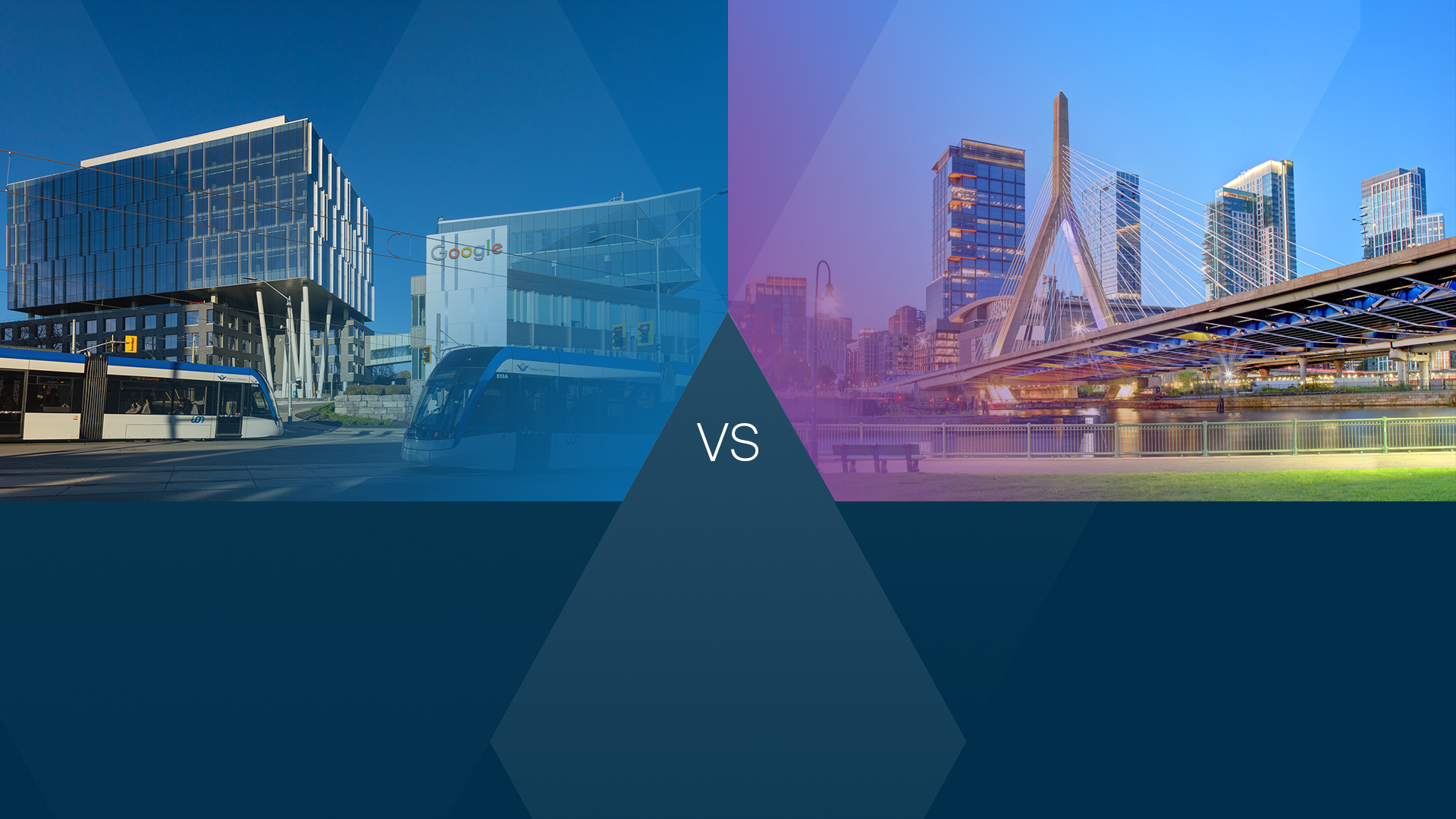If you’re a tech leader exploring growth, chances are you’re keeping an eye on some of the up-and-coming tech hubs in Canada and the US. You might even be doing your own research.
That makes one question especially important: which location best fits your company’s needs, market focus and long-term strategy? Comparative data can help you make smarter expansion decisions – and ensure your choice aligns with your financial, operational and strategic goals.
Boston and Waterloo are two excellent options. With strong educational institutions, robust startup cultures and tech ecosystems that emphasize research and innovation, these two communities are likely vying for top spot on your list of contenders.
How do they compare to one another? The data can help.
In the article below we’ve compared Boston and the Waterloo area across five key metrics, including workforce size, company costs and taxes. Which community comes out on top? Let’s find out.
Key Highlights
- Waterloo’s tech talent growth and concentration far outpaces Boston’s, despite Boston’s formidable tech workforce
- Waterloo region’s population growth is significantly higher than Boston’s (16% vs 1%)
- It costs $66.1M annually to operate a tech office in Boston, while it costs $39.7M to do the same in the Waterloo area
- Payroll and corporate taxes are lower in Waterloo than they are in Boston
Data Point #1: Tech workforce size and growth
Source: CBRE Scoring Tech Talent Report 2025
With 164,000 tech workers, Boston has a formidable tech workforce. The city is home to numerous prestigious universities, including MIT and Harvard University, which are known for computer science and engineering. This naturally boosts Boston’s talent pool.
Waterloo’s tech workforce is small but mighty, with just under 40,000 workers. But its location in the Toronto-Waterloo Corridor – home to a combined 373,600 tech workers – gives it access to one of the largest tech talent pools in North America. That’s more than double Boston’s workforce size.
Another important point to note is that the Waterloo community’s tech talent concentration and growth far surpasses Boston’s. The vast 55% difference in tech growth could be attributed to Boston’s high cost of living and real estate, as well as costly salaries for tech workers.
In comparison, the world-renowned academic and research environment in Waterloo makes it a cost-effective hub for innovation – particularly in fields like artificial intelligence, automation and quantum computing.
Data Point #2: Population growth
Sources: Lightcast, 2025. Population growth from 2018-2023 at the CD/MSA level; CBRE Scoring Tech Talent Report 2025
As one of Canada’s fastest-growing communities over the past five years, Waterloo stands out in this category. Our overall population growth is significantly higher than Boston’s, and we’re seeing rapid increases in both the 20-30 and 30-40 age groups, too.
In fact, the Waterloo region recorded the highest growth in these two demographics out of all fifty regions in CBRE’s Scoring Tech Talent Report 2025. A population surge of young professionals often points to a growing talent pool, strong entrepreneurial spirit and a sustainable workforce for the future.
Matt Elgie, VP Engineering at MasterClass Canada, put it best, saying: “The Waterloo tech ecosystem has incredible talent, a collaborative community and the space for MasterClass to scale our platform, technology and products to meet the needs of our global consumer base.”
Data Point #3: Estimated one-year company cost (USD)
Source: CBRE Scoring Tech Talent Report 2025 – based on office space and wages for 500 people
This is a pretty eye-opening comparison. Based on a standard setup of 500 employees in 60,000 sq. ft. of office space – the benchmark used in the CBRE report – Boston costs nearly $66M annually.
Waterloo, by comparison, comes in at $39.5M – a $26.4M difference. With expensive office space, salaries and housing, the cost of doing business in Boston is high.
Matt Rendall, the CEO of Clearpath Robotics by Rockwell Automation, outlines the exceptional value proposition Waterloo offers tech companies looking to expand, saying: “Waterloo straddles a really interesting balance of the amenities of a big city with the cost of living and the space of a smaller community.”
Based on the quality of life and cost of living, “you end up with a tremendous value proposition in Waterloo.”
Data Point #4: Payroll taxes
Source: Taxes from respective governments – based on an average office-based employee salary of $75,000 USD
In Waterloo, you’ll pay $4,781.08/year in payroll tax for one software engineer, while in Boston, you’d pay $6,060.00, with salaries being the same across the board.
This acute difference in payroll tax can impact your business’ financial and overall success. Depending on the size of your operation, these costs can add up quickly. Fewer taxes and lower salaries represent bigger savings and increased profitability.
Data Point #5: Corporate tax rate
Sources: BDO, 2025 Corporate Income Tax Rates; 2025 State Corporate Income Tax Rates & Brackets; PWC, 2025 Corporate income tax (CIT) rates
Waterloo has an advantageous regulatory environment for business, with lower corporate taxes and government incentives for innovation and R&D. Our corporate tax rate is 2.5% lower than Boston’s.
Expanding to and operating in Boston means dealing with Massachusetts’ relatively high business taxes. If you factor in Boston’s higher payroll taxes too, these costs can quickly add up.
Plus, Canada has several streamlined business immigration procedures, making it easier for tech companies to attract international talent and avoid expensive immigration laws in the United States.
Our new Tech Data Book offers thirteen different tables comparing salaries, taxes, population growth, talent diversity and more across eleven North American tech communities, including Pittsburgh, New York and Silicon Valley. Download your free copy now.
